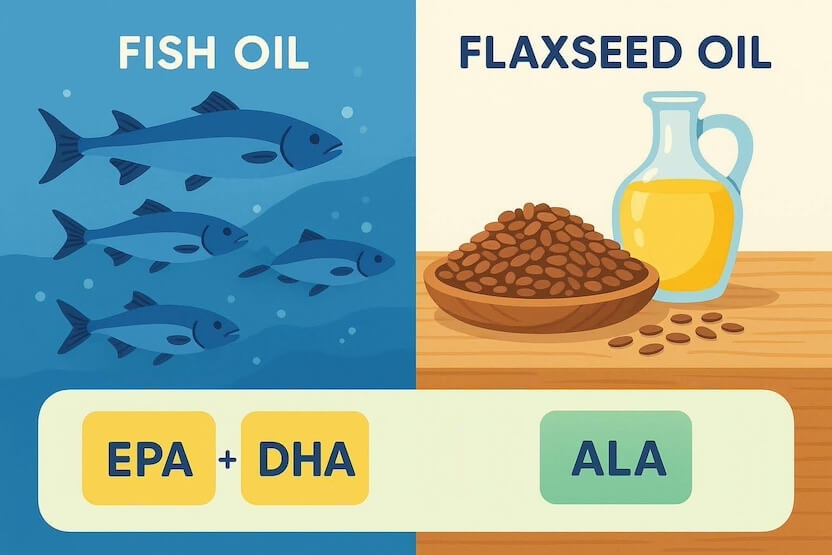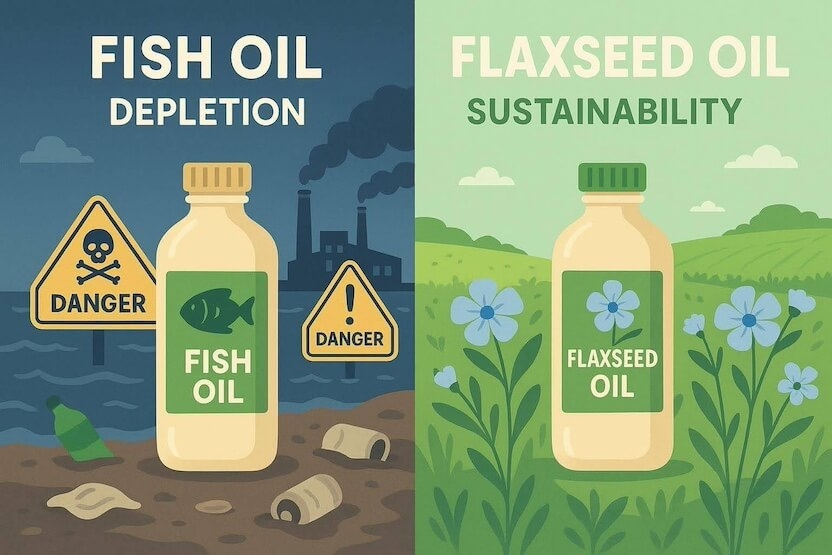Last update: July 16, 2025
5 minute read
Fish Oil Vs Flaxseed Oil: Which Source Offers Better Omega-3 Benefits for Heart, Brain, and Sustainability?
Discover the differences between fish oil and flaxseed oil omega-3s, their health benefits, sustainability, and which supplement best supports your wellness goals.

By Derick Rodriguez, Associate Editor
Edited by Dr. Dimitar Marinov, MD, RDN, PhD

Omega-3 fatty acids are crucial nutrients; while your body can’t make the essential omega-3 ALA, it can produce small amounts of EPA and DHA from ALA, though usually not enough for optimal health. From powering heart health to sharpening cognitive abilities, these essential fats offer benefits that are too important to ignore.
If you lean toward plant-powered nutrition—or care deeply about sustainability—you likely weigh the pros and cons of marine-based omega-3s from fish oil versus plant-based omega-3s in flaxseed oil.
A quality plant-based omega-3 supplement can align with both your wellness goals and eco-conscious mindset. So, which omega-3 source actually delivers the most meaningful bang for your nutritional buck?
Key takeaways
- Fish oil: Immediate EPA & DHA for direct cardiovascular and brain benefits
- Flaxseed oil: Plant-based ALA that converts (in limited amounts) to EPA/DHA
- Eco impact: Flaxseed oil is renewable and typically has a smaller environmental footprint than marine-derived fish oil
Understanding omega-3 fatty acids
Your body craves omega-3s, yet can’t make them on its own. The three main types are: ALA (alpha-linolenic acid), EPA (eicosapentaenoic acid), and DHA (docosahexaenoic acid).
EPA and DHA, found in fatty fish and fish-oil supplements, are ready to use right away. Flaxseed oil mostly supplies ALA, which your body must convert to EPA and DHA. Unfortunately, conversion is inefficient—about 5–10 % of ALA becomes EPA and well under 1 % becomes DHA in most adults.
VitaRx Tip
Fish oil contains ready-to-use omega-3s, while flaxseed oil’s ALA need to be converted—and your body converts just 5-10 % of it.
Health organizations recommend at least two servings of fatty fish per week to maximize EPA/DHA uptake.
Nutritional composition: Fish oil vs. Flaxseed oil
Fish-oil supplements deliver immediate EPA & DHA, making them the fast lane for omega-3 uptake. Flaxseed oil is rich in ALA and contains virtually no lignans, fiber, protein, calcium, or magnesium; those nutrients are found in whole or ground flaxseed, not in the purified oil.
Oil Type | Main Omega-3 Form(s) |
|---|---|
Fish Oil | EPA, DHA |
Flaxseed Oil | ALA |
Whole flaxseed is rich in fiber and lignans; flaxseed oil supplies ALA but lacks the fiber present in the whole seed.
Flaxseed has been around for a long time
Flaxseed is among the oldest farmed crops, valued for thousands of years thanks to its versatile health benefits.
Health benefits comparison
Cardiovascular health
Fish-oil supplementation consistently lowers triglycerides and may provide modest benefits for blood pressure and inflammation, although findings for the latter two outcomes are mixed.
Flaxseed oil, on the other hand, helps reduce total and LDL cholesterol while delivering some potential benefits for triglycerides as well.
Cardiovascular Metric | Fish Oil (EPA/DHA) | Flaxseed Oil (ALA) |
|---|---|---|
Triglycerides | Strong reduction | Mild effect |
LDL/Total Cholesterol | Moderate effect | Notable drop |
Blood Pressure | May reduce | Limited data |
*Typical research protocols use about 1,000 mg combined EPA/DHA per day for triglyceride reduction and 1–2 tablespoons of flaxseed oil daily to increase ALA intake; effects on cholesterol vary by study.
Some observational studies have linked very high intakes of fish-oil supplements with a potential increase in atrial fibrillation or certain stroke risks, but the evidence remains inconclusive.

Brain function & cognitive health
DHA is the brain’s favorite fat. Fish oil supplies it directly, supporting memory, focus, and long-term cognitive resilience. Flaxseed oil’s ALA requires conversion, so its cognitive benefits are indirect and notably weaker.
For vegans who still want direct DHA, consider algal oil, which offers the same brain-ready omega-3 but from microalgae.
Anti-inflammatory properties
Both oils reduce inflammation, yet EPA/DHA in fish oil act more directly. Flaxseed’s ALA may offer a gentler anti-inflammatory boost and add antioxidant benefits.
Oil Type | Primary Anti-Inflammatory Components | Relative Strength |
|---|---|---|
Fish Oil | EPA & DHA | Strong |
Flaxseed | ALA | Moderate |
— Dr. Dimitar Marinov, MD, RDN, PhDFish oil delivers ready-to-use EPA and DHA for direct heart and brain support, while flaxseed oil supplies ALA that your body must convert—albeit inefficiently—to those same benefits, but adds a smaller environmental footprint. Opt for third-party-tested formulas to guarantee purity, potency, and sustainability.
Sustainability & environmental considerations
Overfishing threatens marine ecosystems, making fish-oil sourcing an environmental concern. By contrast, flaxseed is renewable, requires less water, and produces a smaller carbon footprint.

If contaminants worry you, look for third-party-tested fish oil or choose plant-based oils like flaxseed or algal oil, which largely avoid the heavy-metal contamination issues sometimes associated with marine sources.
VitaRx’s commitment to quality & sustainability
At VitaRx, we’re committed to delivering batch-tested, sustainably sourced omega-3 supplements. Every product is third-party certified for purity, potency, and ecological responsibility.
Key Differences | Fish Oil | Flaxseed Oil |
|---|---|---|
Omega-3 Form | EPA & DHA (ready to use) | ALA (needs conversion) |
Absorption | Raises blood omega-3 quickly | Limited DHA/EPA increase |
Sustainability | Risk of overfishing | Highly renewable |
Making smart health choices shouldn’t feel overwhelming. Whether you favor marine or plant-based omega-3s, VitaRx supports you with science-backed, eco-conscious options.
Frequently asked questions (FAQ)
Here are some of the most frequently asked questions about fish oil and flaxseed oil.
Final thoughts
Whether you choose fish-derived EPA/DHA for fast, potent benefits of flaxseed oil’s plant-based spectrum of nutrients and sustainability, omega-3s are non-negotiable for optimal wellness. Reflect on what matters most—immediate potency, environmental impact, or a balance of both—and tailor your supplement strategy accordingly.
Sources and references
- Association Between Omega-3 Fatty Acid Intake and Dyslipidemia: A Continuous Dose-Response Meta-Analysis of Randomized Controlled Trials - PubMed
- Effect of flaxseed supplementation on lipid profile: An updated systematic review and dose-response meta-analysis of sixty-two randomized controlled trials - PubMed
Editor

Derick Rodriguez
Derick Rodriguez focuses on editing health and wellness-related content. With over half a decade of experience in the digital realm, Derick has developed a unique skill set that bridges the gap between complex health concepts and accessible, user-friendly communication. His approach is deeply rooted in leveraging personal experiences and insights to illuminate the nuances of health and wellness topics, making them more approachable and empowering readers with knowledge and confidence.
Fact checker

Dr. Dimitar Marinov
Dr. Marinov has years of experience in scientific research and preventive and clinical medicine. His publications in peer-reviewed journals are on nutritional status, physical activity, and musculoskeletal disorders among adolescents.
At VitaRx, we're not just passionate about our work — we take immense pride in it. Our dedicated team of writers diligently follows strict editorial standards, ensuring that every piece of content we publish is accurate, current, and highly valuable. We don't just strive for quality; we aim for excellence.
Related posts
While you're at it, here are some other relevant articles you might be interested in.

Get your personalized vitamin recommendations in less than
5 minutes.
Get your personalized vitamin recommendations in less than
5 minutes.






